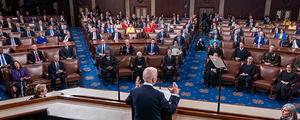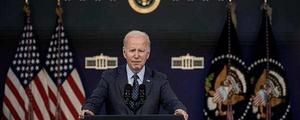Story Highlights
- 65% want leading or major role for U.S.
- Republicans much less likely to favor prominent role than in past
- Most Americans dissatisfied with U.S. position in world
WASHINGTON, D.C. -- Sixty-five percent of Americans prefer the U.S. to take the leading (20%) or a major role (45%) in world affairs. This is down from 69% in 2019 and 72% as recently as 2017. The current figure is one percentage point below the prior low from 2011. In almost all years since Gallup first asked the question in 2001, more than seven in 10 Americans have favored a leading or major role for the U.S., including a high of 79% in February 2003.
In addition to the current 65% who want the U.S. to take a substantial role in world affairs, 27% prefer a minor role and 7% want it to have no role at all. This is only the second time, along with 2011, when more than 30% wanted the U.S. to take a limited role, if any, in trying to solve international problems.
The results are based on the annual Gallup World Affairs survey, conducted Feb. 1-23.
Republicans and independents (both at 61%) are much less likely than Democrats (75%) to want the U.S. to take a leading or major role in world affairs. Ten percent of Republicans and 9% of independents, but only 3% of Democrats, want the U.S. to have no international role.
Fewer Republicans and independents than in any prior year advocate for a prominent international role for the U.S. The percentage of Republicans wanting the U.S. to take the lead or have a major role in world affairs is significantly lower than the group’s prior low of 69% in 2011. It also marks a sharp departure from what Republicans wanted during the George W. Bush administration, when more than 80% of Republicans favored a leading or major role for the U.S.
This new Republican low is likely influenced by their disagreements with President Joe Biden’s foreign policy but also differences in foreign policy between the last two Republican presidents. Bush’s active U.S. foreign policy contrasts with Donald Trump’s “America First” approach to international matters, which argued for a much more limited U.S. role in international alliances and conflicts.
During the prior Bush administration, an average 84% of Republicans preferred a prominent U.S. role in world affairs. That fell to 73% when Democratic President Barack Obama took office and stayed at that level even after Trump replaced Obama, before dropping to 61% this year.
Since 2010, two-thirds or less of independents have said the U.S. should have a major or leading role in world matters, but before then, the percentages were mostly above that level.
The 75% of Democrats who prefer significant U.S. involvement in international affairs matches the group’s historical average, though this figure has varied from a low of 68% in 2004 and 2005 during Bush’s presidency to a high of 82% in 2012 under Obama.
Steady 37% of Americans Satisfied With U.S. Position in the World
Thirty-seven percent of Americans are satisfied and 62% dissatisfied with the U.S. position in the world today. These figures have been highly stable during the three years President Joe Biden has been in office. The current reading is also similar to what Gallup measured during the Obama presidency and the first year of the Trump administration, before Republican satisfaction surged between 2018 and 2020, then tumbled after Biden replaced Trump.
The high point in satisfaction was 71% in the months after the 9/11 terrorist attacks.
Currently, 61% of Democrats, 38% of independents and 11% of Republicans are satisfied with the United States’ position in the world.
Public Divided on Whether Rest of World Views U.S. Favorably
Americans’ perceptions of how the rest of the world views the United States have also been highly stable the past three years, with roughly as many believing other countries have a favorable opinion of the U.S. as say they have an unfavorable one. This year, 49% say the U.S. rates favorably and 51% unfavorably in the eyes of the world.
Opinions were also more positive in the last three years of the Trump presidency than they are now, buoyed by nearly record-high ratings among Republicans.
But Americans were even more likely to think the rest of the world viewed the U.S. favorably in the early 2000s, including in two measures taken in 2000 and 2001 before 9/11. The record high was 79% favorable in 2002, while the low point was 40% measured in 2007 when the U.S. was still embroiled in wars in Iraq and Afghanistan.
Two-thirds of Democrats (67%), a slim majority of independents (51%) and 27% of Republicans believe the U.S. rates favorably in the eyes of the world.
Americans Don’t Think World Leaders Respect Biden
Thirty-seven percent of Americans say leaders of other countries respect Biden, down slightly from 40% a year ago and well below the 58% reading early in his term. Other presidents have had ratings the same as or worse than Biden’s at some point in their presidencies, including his three immediate predecessors -- Trump, Obama and Bush. Bush’s 21% reading in 2007 is the lowest Gallup has measured to date.
Historically, it has been more common for presidents to be below rather than above 50% on this measure. The exceptions include Bush in 2002 after 9/11, Obama from 2009 to 2013, his first five years in office, and Biden in 2021, his first year as president.
As would be expected, Democrats are mostly inclined to think other leaders respect Biden (71%), while 36% of independents and 6% of Republicans agree.
Bottom Line
While most Americans still want the U.S. to have a major, if not the leading, role in international affairs, fewer than at any time in the past prefer this approach. Republicans increasingly want a more limited U.S. role, though this remains the minority view of the party’s supporters. More broadly, Americans remain rather negative about the United States’ international standing, with more dissatisfied than satisfied with the U.S. position in the world, the majority believing world leaders do not respect President Biden, and the public evenly split on whether the international community views the U.S. positively or negatively.
To stay up to date with the latest Gallup News insights and updates, follow us on Twitter.
Learn more about how the Gallup Poll Social Series works.




